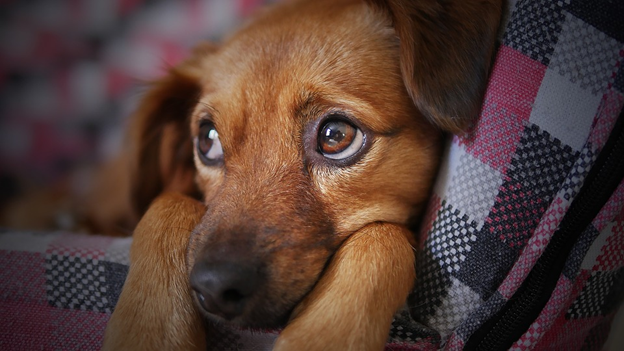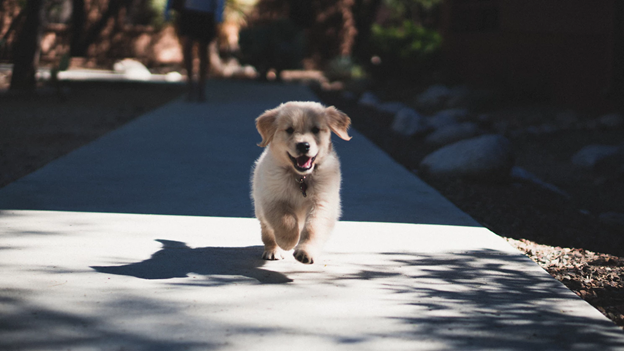
How to Raise Your Puppy Without Separation Anxiety
You’ve just bought home your new puppy and everything is going perfectly so far. That is until the honeymoon period is over and it’s time for you and the other adults in the house to go back to work, while the kids head back to school. It is at this time that many puppies start to develop separation anxiety: a psychological disorder that, if untreated, will see your puppy start to panic as soon as you show signs of leaving the house. As your pup gets older, this form of hyper attachment can manifest in extremely undesirable ways including destructive behavior, unstoppable barking or howling, and your careful toilet training out the window as your dog starts having accidents in the house.
It’s important to remember that the symptoms of separation anxiety in dogs are not behavioral and certainly are not done maliciously by your dog. For an otherwise trained and calm dog to begin having accidents inside the house and tearing your furniture apart, you can only to imagine the level of distress they must be feeling. Separation anxiety is not pleasant for anyone, from your panicking dog to the neighbors putting up with the barking, and you coming home to a destroyed living room.
How, then, can you stop the problem from occurring, working with your new puppy to ensure that separation anxiety doesn’t have the chance to manifest? Read on for an overview of separation anxiety in dogs and some simple tips to prevent the problem from ever occurring.
Set Your Puppy Up For Success
The first step is to set the puppy up for success. This means taking steps to make it as easy as possible for your puppy to find ways of entertaining themselves while they’re home alone.
As you get to know your new family member, you will come to understand the types of toys and treats they enjoy, and you can use this information to your advantage. For some puppies, nothing beats a squeaky toy, while others prefer a soft stuffed animal to play with. Some toys can be stuffed with appropriately-sized pieces of frozen food or kibble, giving your puppy plenty of incentive to keep gnawing away to access the food rewards.
Another way that you can set your puppy up to succeed on their own is to give them some background noise for company, such as a radio or even a TV set with the volume on low. You could even lend your puppy something that smells of you – a shirt ready to be laundered, for example – to comfort them while they’re alone.
Whatever you choose, make sure that your puppy only has access to these special items while they’re alone. The idea is to subtly reward your dog for being alone, helping them make the association that alone time is fun time.
Leaving and Arriving? No Big Deal
As much as you will miss your puppy while you’re at work, the last thing you want to do is to make a big emotional scene every time you leave. Similarly, while it’s an amazing feeling to joyfully greet your dog the second you return, try to be as calm as possible when you do come back home.
Dogs have an uncanny ability to pick up on the feelings and emotions of their human family, and if you treat each arrival and departure as a monumental occasion, so too will your puppy.
When getting ready to leave, don’t give your puppy too much attention in the ten minutes or so before you walk out the door. Calmly get yourself ready, make sure your puppy has everything they need, and then leave with an upbeat “Bye Lucy! Be good!” without a big fanfare. When you return, wait until your puppy is calm and quiet before greeting them. Simply ignore any puppy bad habits like jumping up or barking, and reward your puppy with your attention after they’ve settled down.
Don’t Start Something You Can’t Finish
This tip refers to those vital first few days after you bring your new puppy home. Ideally, you will introduce your puppy to the family at a time when you can be home for at least the first few days, so you can take the time to ensure they’re settled in properly and that they’re feeling safe and comfortable in their forever home.
But unless you work from home and have no plans of ever leaving the house, the time will come when your puppy will need to learn to be home alone. For this reason, don’t spend every second of the day with your new puppy, even in those first few days when you’re home together. While it may be tempting to take your puppy with you everywhere you go, doing so will be setting your puppy up for serious separation anxiety issues when you do eventually leave the house.
Most puppies will sleep as much as 16 to 18 hours per day when they are very young, so finding opportunities for the puppy to be alone – even while you’re home together – shouldn’t be hard. Start by having your puppy sleep on their own bed, rather than curled up with you on the couch. Mealtimes are another important activity for puppies to undertake on their own, as is the freedom to explore a safe area of the backyard for a bathroom break.
Mental and Physical Exercise
A tired puppy will be a calm puppy, and you’ll have a much greater chance of successful separation if your puppy is already worn out from plenty of exercise: both mental and physical. On the other hand, a frustrated or bored puppy is much more likely to become nervous and anxious when left home alone.

How to Raise Your Puppy Without Separation Anxiety
For new puppies, a five-minute training session will be enough to tire them out mentally, while a walk or a short game of chase, tug, or fetch will be all the physical exercise they need to prompt their next nap.
There is no telling why separation anxiety begins to develop in some puppies and not in others, and why it can manifest into an enormous problem in some older dogs, while other dogs can remain calm even when left alone for long periods.
Treating separation anxiety in a grown dog can be a long and difficult process, making it all the more important to implement these simple steps with your new puppy to minimize the chances of separation anxiety ever starting. By making sure your puppy has everything they need to keep themselves occupied while you’re away, keeping your departure and arrival low key events, and ensuring that your puppy is mentally and physically exercised before you go, you can set your puppy up for success and help them to realize that being home alone is nothing to be concerned about.
Author Bio:

James Woller of ReleaseTheHounds.ca
James Woller is a long-time dog enthusiast and owner of Release the Hounds, a professional dog walking and boarding company in Vancouver, Canada. On his days off from running his company, he enjoys learning and writing about topics that are of interest to caring pet owners.
